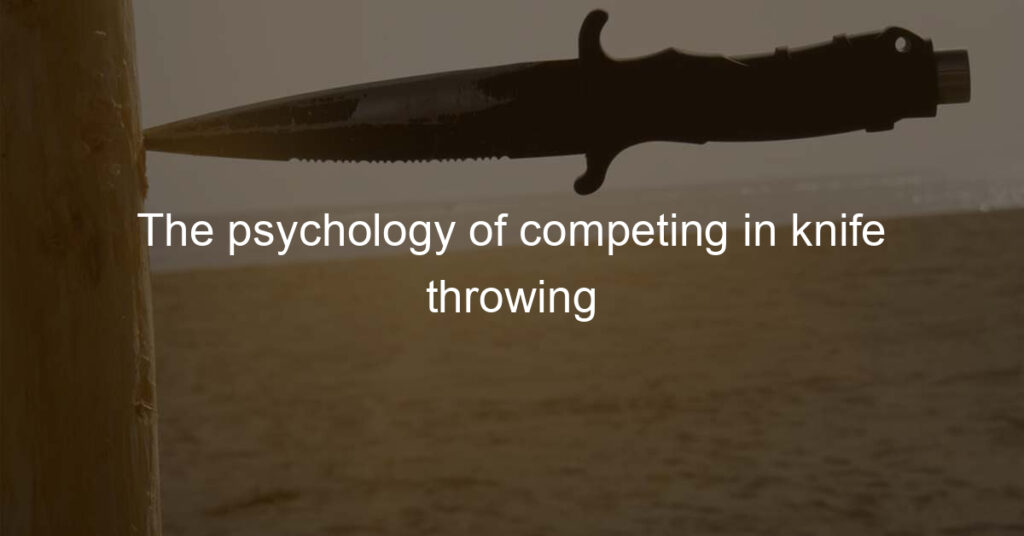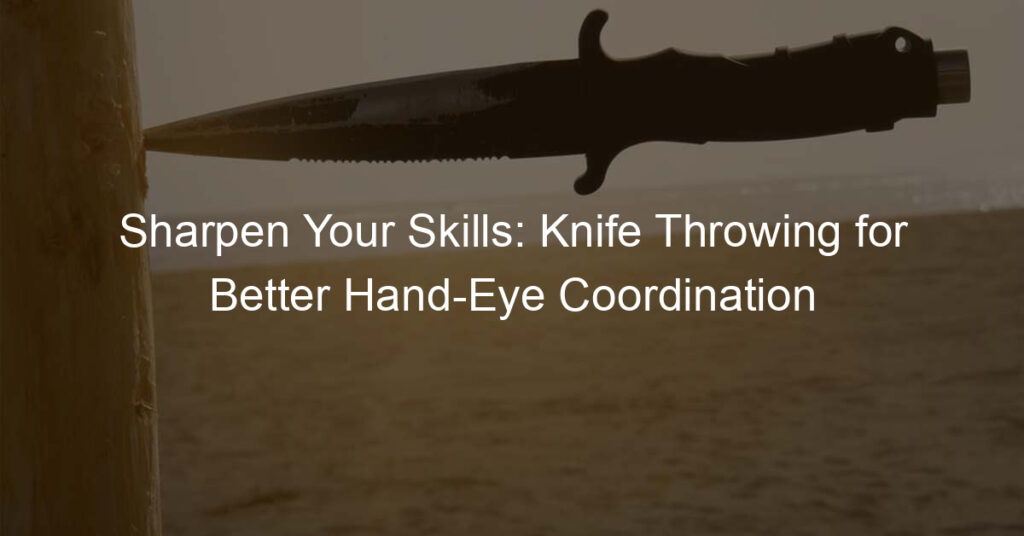Are you someone who likes to push your limits and test yourself? Do you get a thrill from the competition of knife throwing? Then this is the article for you! Here, we’ll be exploring just what goes into competing in this exciting sport. We’ll discuss everything from mental preparedness to target strategizing so that you can take your skills from the amateur level up to pro status. So if you’re ready for some knife-throwing fun, read on!
What makes knife throwing a competitive sport?
Knife throwing is unlike any other sport. It is the perfect balance of precision and danger, and this combination of high stakes makes it an exciting form of entertainment.
Even though knife throwing requires a significant amount of skill and practice to be truly successful, it has become a hugely popular spectator sport – especially at events like The World Throwing Games where people from around the world compete for titles.
A big part of what makes knife throwing a competitive sport is that split-second accuracy as well as the adrenaline rush that comes with standing feet away from your target.
What are the benefits of knife-throwing competition?
Knife-throwing competitions can be both incredibly exciting and surprisingly beneficial. Competitive contests like these teach participants essential skills that are important in everyday life, such as focus and accuracy. In addition, they help build confidence and encourage team spirit by providing a sense of accomplishment after mastering the art of hurling sharp blades toward a target. If you enjoy a healthy dose of competition, knife-throwing days offer the perfect opportunity to practice a fun hobby while meeting new people with similar interests. And don’t forget – if you’re looking to take your skillset one step further, there are even prizes up for grabs at many larger-scale tournaments!
How does knife-throwing impact one’s mental health?
Knife throwing is a surprisingly cathartic activity that can have a great effect on mental and emotional well-being. While most often associated with circus acts or old Western movies, this activity is gaining popularity as an enjoyable recreational pastime.
People who practice throwing knives often report feeling more relaxed when they get into the flow of the routine. This calming sensation can be beneficial for decreasing stress levels, removing worries, and improving one’s outlook on life. Knife throwing also encourages users to stay focused and attentive to the task at hand – traits that are important for achieving well-being in all aspects of life.
Additionally, any constructive activity when done regularly can have powerful psychological benefits like improved self-confidence and better problem-solving skills. If you’re ever feeling blue, give knife throwing a try!
What mental skills are required for knife-throwing competition?
Knife throwing is not just a physical sport; it requires as much mental acuity as it does strength and accuracy. The perfect throw of the knife is the result of psychology, practice, math, and focus. Knife throwers need to have excellent hand-eye coordination, anticipate distances accurately, and make split-second adjustments even in challenging conditions.
They must also stay mentally alert throughout the competition and constantly assess their performance. Above all else, knife throwers need to exercise immense self-discipline and maintain clarity amidst distractions that can miscalculate a throw. With the right mix of mental attributes and best practices honed over time, anyone can develop winning throws for success in this thrilling athletic event.
How do competitors stay focused during knife-throwing?
Competitors who participate in knife-throwing events understand the gravity of the situation, so they must stay focused to succeed. It starts with mental preparation: competitors must be aware of their thoughts and take deep breaths during each throw to ensure they are calm and collected.
During a competition, bystanders can help by offering positive affirmations to keep their spirits up, so competitors can perform their best. Practicing regularly is also essential for any competitor’s success; without experience and skill with a variety of throwing techniques, it is easy for a contestant to become flustered or overwhelmed during a tournament.
Ultimately, however, staying focused during a knife-throwing competition boils down to confidence in one’s technique and the ability to stay composed when competing at a higher level.
What are some common psychological challenges in knife-throwing?
Knife throwing is an interesting activity, and it’s also a great way to express creativity. However, there are psychological aspects that can make knife throwing a challenge. For one thing, there can be fears and doubts about safety when engaging in such an activity.
Additionally, aim and accuracy can become mental roadblocks that are difficult to overcome. Building confidence in oneself and the ability to focus on the task at hand are key psychological skills that must be cultivated to succeed at knife-throwing. Overcoming these potential issues will allow you to discover the satisfaction of success when trying something new!
Can knife-throwing competition be used for therapy?
Knife throwing may seem like a dangerous hobby, but experts believe that it can have therapeutic benefits. Throwing a knife requires focus and concentration which encourages mindfulness, while the physical nature of knife-throwing builds strength and dexterity.
It also gives people who partake in competitions a sense of purpose. Since it is such an individual endeavor, it is ideal for those looking to improve their self-confidence, or for individuals looking for creative problem-solving strategies.
Knives require precision, so participants must stay in tune with their emotions and reactions to achieve success. Thus, many people can benefit from taking part in competitive knife throwing.
How does knife throwing help develop mindfulness?
Knife throwing may not appear to be a mindfulness activity, but in reality, it can help develop the skill. Along with giving you a higher level of concentration and focus, knife throwing helps practitioners understand the importance of being present at the moment.
For example, to successfully hit a target requires being so focused that every part of your body and movement during the throw has to be just right. Everyone’s mind may tend to wander during meditation and yoga, but due to its interactive nature and precision, knife-throwing is an exciting way to study mindfulness and remain aware.
With increased practice comes increased awareness as one learns their body language, posture, and motion can play a big role in hitting one’s target—that is why it is more than just aiming correctly, knife throws require quick reflexes and an engaged mindset.
How can mental toughness be improved in knife-throwing?
Knife throwing can be a great way to boost confidence, alleviate stress, and have some fun. To improve your mental toughness when it comes to this skill, practice is essential. When beginning knife throwing, it is important to start with a lighter knife so the motion and feel of the throw can become comfortable.
Finding the right five-foot distance between the thrower and the target is also critical to maximize accuracy. Keeping track of progress through keeping score will help keep someone motivated as well as allow them to see their improvement over time.
Lastly, doing visualization exercises such as picturing movements helps develop muscle memory that could lead to an increase in mental toughness.
How does visualization play a role in knife-throwing competition?
Visualization plays a key role in knife-throwing competitions and can give participants a mental edge. Competitors will commonly close their eyes or look away from the target before they throw, visualizing the route their knife should take and envisioning where it will land with pinpoint accuracy.
According to a large number of successful athletes, this method enables them to relax and concentrate on the outcome, rather than the procedure itself, which in turn enables them to accomplish more consistent throws. Competitors may gain the knowledge, abilities, and self-assurance necessary to do well in knife-throwing events by practicing not just their physical but also their mental talents.
Conclusion
In conclusion, competing in knife throwing is a mentally-demanding experience. It requires planning and discipline, yet also calls on the thrower to embrace uncertainty and be able to act quickly if necessary. Knife-throwing competitions need to respect safety regulations and ensure that all participants in the competition feel secure in their environment. But overall, with some dedication and skill, it can be an incredibly satisfying activity for any true precision enthusiast. Knife throwing is becoming increasingly popular as more people discover this empowering sport – whether it’s for fun or to make some money, there’s something special about pursuing excellence one throw at a time.







